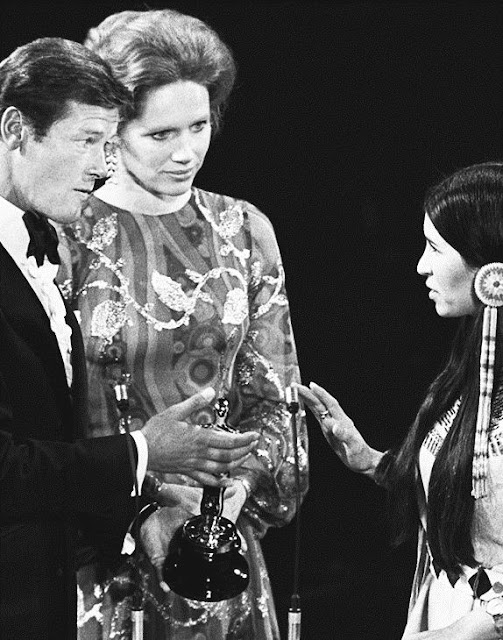APOLOGY
The other day I noticed that the Academy of Motion Picture Arts and Sciences issued an official apology to Sacheen Littlefeather for having done damage to her show business career. Fifty years ago, Miss Littlefeather appeared on stage at the Academy Awards having been sent there by Marlon Brando to share his reasons for declining the Oscar. When Brando's name was read off, Sacheen made her way on to the stage where the perplexed presenters, Roger Moore and Liv Ullman, produced a more genuine reaction than either had ever managed on the screen. In her non-acceptance speech, Sacheen explained that Marlon was going to pass on the Oscar to call attention to the way Native Americans had been portrayed by Hollywood.
Today's Oscar ceremonies rarely conclude without a pitch for some cause but it hadn't been done prior to Sacheen and her words prompted grumbling and boos from the audience. It's no surprise that her future as an aspiring actress ended that night.
Sacheen was naive if she thought there wasn't going to be a comeuppance for embarrassing Jack Valenti, the President of the Motion Picture Association of America. Valenti began his 38-year reign as MPAA President in 1966, having come from his post as Special Assistant to U.S. President Lyndon Johnson. He was summoned to Hollywood by Universal Studios Chief Lew Wasserman who along with Valenti controlled the movie business for decades. It's not surprising that Hollywood waited until Valenti was long dead to offer an apology. The notion of any sort of thoughtful gesture surely would have produced "over my dead body" from a living Valenti. Despite his diminuative stature, Jack had more than ample political clout to get others to see his side of things. When VCR technology was first introduced, he informed the U.S. Congress that "the VCR is to the film producer as the Boston Strangler is to the woman alone", resulting in the1998 Digital Millennium Copyright Act.
Hollywood leaned on this for the first time in 2004 to make an example of the "Prince of Pirates" Johnny Ray Gasca. Having been on the lam for 16 months, Gasca was finally picked up by the authorities and brought to court to face charges of having built a thriving enterprise distributing videos of first run films. In reality, Gasca had simply sat in a movie theater with his camcorder, shot what was on the screen, gone home and made copies to sell out of the trunk of his car - although certainly a naughty boy, it's a far cry from Albert DeSalvo. For this dastardly deed, Gasca was looking at a fine of more than a half-million dollars and a maximum sentence of 33 years in prison. I wouldn't be surprised if prior to issuing their letter of apology, the Academy sent someone out to Arlington Cementery to verify that Jack was indeed still there.
The Academy chose to wait 50 years before sending their letter of apology to Sacheen despite Hollywood having long ago adopted supporting causes as SOP. This seems odd but Sacheen has a history of generating unwanted controversy. After Sacheen was blacklisted, she sought a broader appeal, stating that she stood for not just Native American women or indigenous women, but all women everywhere. Which made things quite baffling when she was featured in a three-page spread in Playboy Magazine.
Reading about Sacheen's funeral, I came across one final surprise. Sacheen's two sisters attended her funeral where one of them explained that Sacheen and their entire family going back many generations was Mexican with no Native American ancestry whatsoever. This was consistent with what Roger Ebert had suggested in 1973. Sacheen had taken on this "pretendian" identity in hopes of pursuing a career in Hollywood. Sacheen suffered to some extent from mental illness and the sisters hadn't made public her true heritage previously as she wasn't doing harm to anyone.


